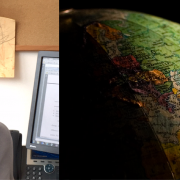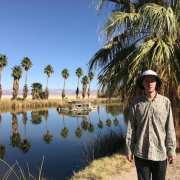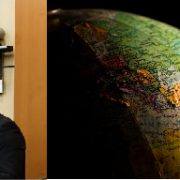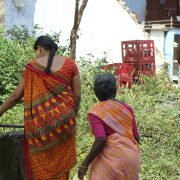Finding the Global in Central America: A Conversation with Susan Kandel
The following interview is an edited transcription of a conversation with Luskin alumna Susan Kandel (MA UP ’95)
What led you to pursue a Masters degree in Planning in Regional and International Development urban planning, and why did you choose to study at UCLA?

Susan Kandel in the foreground. In the background is the ex-director of PRISMA and the ex-Minister of the Environment for El Salvador under the first left government.
I began to consider UCLA’s urban planning program back in the 80s. I was working for El Rescate, a Central American Refugee Center in Pico-Union at the time, where I was director of the human rights department. I had heard about UCLA’s progressive planning department and began learning more about it through some of the interns we had at El Rescate, and I was interested in community economic development. I had also heard about and was interested in the Community Scholars program at UCLA. So it was at this time I decided hey, I’m going to go back and get a masters, and so I applied. It was actually the only place I applied to.
What was the source of your interest in community economic development?
Prior to UCLA, much of my work with El Rescate had been concerned with truth and reconciliation after El Salvador’s civil war, which meant working with human rights groups to compile information about human rights abuses and military officers responsible for systematic human rights violations —the Index to Responsibility—to deliver to the Ad Hoc and Truth Commissions. These kinds of reports were primarily concerned with civil and political rights, and so I became interested in what reconciliation might mean with regards to socio-economic rights, how to address those rights, and specifically what it might look like for community economic development for the refugees we worked with at El Rescate. I didn’t know much about the “how” of promoting social and economic development, another reason why I applied to UCLA’s planning program.
Did your time at UCLA live up to your expectations? How did it shift your intellectual and career trajectory?
I definitely feel like it was worthwhile. I remember there being a small community of students who were particularly interested in urban planning and development issues in Latin America. John Friedmann was my main advisor. When I arrived I was a bit naïve in thinking that, why can’t there be a structure to thinking about socio-economic rights in the same way there is for civil, political rights? I remember having conversations with John about whether one could build a legal framework for the “2nd generation of rights” (social and economic rights) somewhat parallel to the existing international legal framework for what is known as the first generation of rights (political and civil rights). He seemed a bit cynical, and I came to agree that with him, that aspiring for economic, social and environmental justice requires much more than a “legal” framework – it requires much more complicated and systematic changes.
During the program, I continued working at El Rescate and was able to conveniently set up my client project with them. My project looked at understanding the rules and regulations in El Salvador governing financial institutions, and figuring out how remittances might channel through community development banks rather than traditional banks. How do you leverage remittances for bi-national community economic development? How do you link up Salvadorans who are sending money to Salvadorans who are receiving money for community development projects?
So I applied to funding to do my field work in El Salvador over the summer. And at that time I met the person who is my current partner. He was an ex-combatant who had been picked up during the war and then exiled for two years, so on the day of the Peace Accords he returned. So if we were going to be together, there was no question that we were going to settle in El Salvador.
It seems that your work and career doesn’t quite fit the conventional idea of what it means to be a planner. Did the program make you think differently about what planning means? Did you have any particularly influential professors?
I think urban planning is kind of a misnomer. Planning brings to mind zoning, plans, rules, regulations. But I approached it from more of a combination of political science and political economy. Obviously you can pick and choose the aspects of planning you want to focus on. In terms of influential professors, I really liked Michael Storper and I tried to take as many of his classes as possible. And I wanted to take classes from Susanna Hecht but never had the time to do so, which was OK because I remember hearing that to take both Michael Storper and Susanna Hecht was a heavy load, and since I was working I had to be conscious of work load. I also really liked John Friedmann. There was also Gilda Haas and Community Scholars. Overall the program really got me up to speed so to speak on the array of issues that one needs for working in the regional and international development field.
Readers will be interested to know that you are currently the Executive Director of PRISMA (a regional NGO think tank on Development and Environmental issues). Can you talk about PRISMA’s work and what attracted you to it?
 I’ve been at PRISMA since 1997. Today, PRISMA is small, with 21 staff, of that only 10 are researchers. We work across Mesoamerica, with three geographic focus areas: El Salvador, the Pacific side of the region, and the Caribbean side of the isthmus. On the Caribbean side you have indigenous groups with access to communal forest and land. On Pacific side is more urban. You have logistical platform going through. A lot of landless poor. In El Salvador our work has been about how you bring environment and land use into the picture. And that brings you to the people, who are mostly families and farmers. And adaptation and restoration, there is years of drought, and before that flooding. So figuring out how to adapt to these situations is our focus. Territorial Governance in the Context of Climate Change in Central America is the theme of our 5-year strategic plan. We’ve also recently launched a program aimed at training the next generation of researchers—Formacíon y Induccíon—with the help of academics and like Tony Bennington and Susanna Hecht, as well as key political analysts and territorial leaders from the region.
I’ve been at PRISMA since 1997. Today, PRISMA is small, with 21 staff, of that only 10 are researchers. We work across Mesoamerica, with three geographic focus areas: El Salvador, the Pacific side of the region, and the Caribbean side of the isthmus. On the Caribbean side you have indigenous groups with access to communal forest and land. On Pacific side is more urban. You have logistical platform going through. A lot of landless poor. In El Salvador our work has been about how you bring environment and land use into the picture. And that brings you to the people, who are mostly families and farmers. And adaptation and restoration, there is years of drought, and before that flooding. So figuring out how to adapt to these situations is our focus. Territorial Governance in the Context of Climate Change in Central America is the theme of our 5-year strategic plan. We’ve also recently launched a program aimed at training the next generation of researchers—Formacíon y Induccíon—with the help of academics and like Tony Bennington and Susanna Hecht, as well as key political analysts and territorial leaders from the region.

3rd training module for young researchers from the region on “Territorial Governance in Central America: Analytical concepts, frameworks and approaches”.
From Left to right: Nelson Cuéllar (Deputy Director, PRISMA), Benedicte Bull (Oslo University), Susan Kandel (Director, PRISMA), Susana Hecht (UCLA), Tony Bebbington (Clark University) (Another of the professors for this modular who does not appear in the photo is Leticia Merino of UNAM). This program includes 1 to 3 young scholars and/or territorial leaders (campesino or Indigenous) from each of the Mesoamerican countries.
What would you say is particularly unique about PRISMA’s approach?
PRISMA (The Regional Research Program on Development and Environment) is a regional non-profit non-governmental research organization based in El Salvador founded in 1992. PRISMA´s mission is to generate information and learning to strengthen livelihoods and innovate development strategies to ensure inclusive, equitable and sustainable governance in Central America. The institutional goal for this period (2012 – 2016) is to contribute to enhancing territorial governance in Mesoamerica in the context of climate change. Accordingly, PRISMA focuses on related topics, such as territorial and landscape governance, rights, mitigation and adaptation, food security, transformation of agricultural and productive processes, economic dynamics, as well as other relevant topics for the region in these challenging times of globalization and climate change.
PRISMA has gained recognition as a key organization in Central America that adds value through knowledge mobilization, dialogue and advocacy to achieve an appreciation of the full value of rural communities and spaces. Its work promotes interactive processes of communication and critical reflection on current realities at multiple scales (territorial, national, regional and international) among a variety of actors and perspectives, as a part of its knowledge generation process. In addition, PRISMA disseminates knowledge among a wide range of actors that are considered key in the advancement of the revalorization of rural communities and spaces.
One of the things that drew me to PRISMA is that it involves working with small teams in a collaborative working environment. I also liked that it had a political ecology, political economy approach. So those were all things I really identified with, and PRISMA as an organization was unique, especially at the time it started. The civil war had just ended, and the country was incredibly polarized.
It was around 2002 when Susanna Hecht got in touch with us. She had a research project with the Salvadoran Ministry for the Environment, and wanted to meet with us because she had seen our work. And I remember thinking “wow it’s Susanna Hecht. She’s great!” And it ended up really clicking. And so out of that, Prisma and Susanna started doing a bunch of research projects together, with the MacArthur Foundation, we did joint publications on an array of issues, and now she´s contributing to our Program to form young researchers in the region. .
Global Public Affairs offers summer placements for students to do work abroad. If Luskin students expressed interest in PRISMA, would you have the need or capacity to take them on?
Yes, although they would need to be vetted in terms of expectations and seriousness about the work. We’ve had different students at different times and have had great students. Students should keep in mind that a lot of the work we do is desk research. Often students come down thinking they will do work in the field, constructing water systems or something, which we don’t do.
Turning now to the broader topic of global public affairs, why do you think UCLA students of urban planning, or any other student, should study El Salvador, or Central and South America?
One, obviously, is that Central America is very globalized, especially El Salvador. 20% of the population lives outside of the country. The single biggest source of foreign exchange is remittances, it has one of the highest rates violence that has everything to do with being between the US market for drugs and its production in South America, and then add to it that US foreign policy has always had Central America as its back door. So I think there’s a sense of responsibility if you’re from the states to learn about the history and the contemporary issues of Central America. And if you’re interested in global issues, Central America reflects that in a lot of ways that links to US foreign policy, history, economic systems, trade culture, etc. There is so much interchange in terms of trade, ideas, populations, between the US and Central America.
The aim of Global Public Affairs @ UCLA Luskin, is to prepare students intellectually and professionally to navigate the rapidly-changing, increasingly interconnected global world we live in. How do you see your work as relating to or benefiting from a global perspective?
Any solutions have to be multi-level. You can’t just have a global solution like the Climate Change Convention, and it can’t just be local, it needs to be approached locally, regionally, and globally. This also applies to disciplines—no one discipline can address these issues by itself. Any solution must also be a multi-disciplinary one. For example, on an environmental level, Central America is one of the most vulnerable regions to climate change. Which is once again tied to global dynamics, development trajectories, and institutional frameworks but at the same time has everything to do with place, cultural and local histories and the interrelationship of these dynamics that mold responses on the ground.
What advice do you have for students who seek careers in global public affairs?
You can’t get into this line of work if you’re interested in making money. Which of course isn’t the nature of NGOs. You also have to be an optimist in the end, and to be truly interested and invested in what you’re doing. I get amazed by the people I work with, who have amazing hope for change. One of the things I love about Central America is that I feel much more hopeful for change. In the states you get this feeling that it’s a fringe movement to be concerned with climate, environmental and social change. I mean [Lusking students] are in the program to begin with, so they must already have some sense of wanting to make positive change. Also, you can’t be dogmatic. It’s really about collective thinking at the end, so students should value that aspect of learning while at Luskin.
 Susan Kandel has a Masters in Urban and Regional Planning from UCLA, and an undergraduate degree in Sociology, with post-graduate studies in Sustainable Environmental Management from UC Berkeley. Susan has published on topics of rural territorial management and governance; migration and rural livelihoods; compensation for ecosystem services; institutions for natural resource management (property rights, collective action and social capital); and human rights. Currently, Susan is the Executive Director of the Salvadoran Research Program on Development and Environment (PRISMA). Before assuming the position of Executive Director, she served as a Senior Researcher and Member of Directing Team of the Foundation for more than a decade. Prior to working with PRISMA, Susan participated and coordinated several research projects both in El Salvador and in the United States, primarily on topics of development and transnational migration.
Susan Kandel has a Masters in Urban and Regional Planning from UCLA, and an undergraduate degree in Sociology, with post-graduate studies in Sustainable Environmental Management from UC Berkeley. Susan has published on topics of rural territorial management and governance; migration and rural livelihoods; compensation for ecosystem services; institutions for natural resource management (property rights, collective action and social capital); and human rights. Currently, Susan is the Executive Director of the Salvadoran Research Program on Development and Environment (PRISMA). Before assuming the position of Executive Director, she served as a Senior Researcher and Member of Directing Team of the Foundation for more than a decade. Prior to working with PRISMA, Susan participated and coordinated several research projects both in El Salvador and in the United States, primarily on topics of development and transnational migration.














